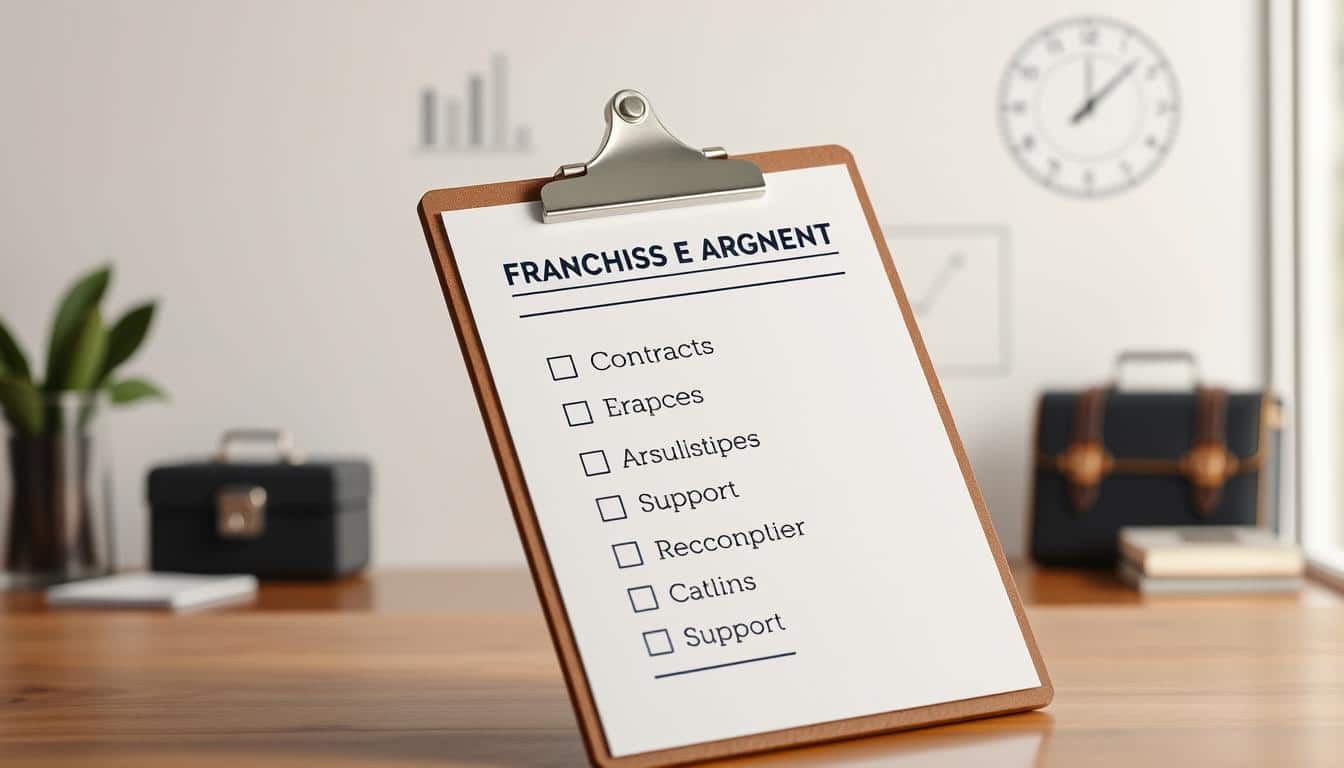Thinking about a franchise? It’s important to know you’re not just investing in a business. You’re also protecting your rights legally. Franchise agreements are key to a successful partnership. They outline the rules, fees, and territory rights for both sides.
Franchising is a growing way to start a business. It lets you run a business with the help of a well-known company. But, understanding franchise agreements is complex. This guide will help you know what to look for, so you can make smart choices.
Key Takeaways
- Franchise agreements are essential for maintaining brand integrity across locations.
- The documents define rights and responsibilities for both franchisors and franchisees.
- Key components include fees, territory rights, training, and operational guidelines.
- Legal advice is vital for navigating franchise agreements successfully.
- Negotiation opportunities exist in areas such as royalty fees and territorial rights.
- Awareness of compliance with federal and state regulations is vital.
What Are Franchise Agreements?
A franchise agreement is a contract between a franchisor and a franchisee. It lets the franchisee run a business with the franchisor’s brand. This document outlines what each side must do and what they can expect. It makes sure the business looks the same everywhere.
About 80%-90% of these agreements have quality standards set by the franchisor. This shows how important it is to follow these rules to succeed.
Definition of Franchise Agreements
The franchise contract explains how the franchisee can operate. It covers things like branding, how to run the business, training, marketing, and quality control. A clear franchise disclosure agreement is key. It makes sure everyone knows what they’re getting into before they start.
These agreements protect both sides and guide their partnership. They help keep the business running smoothly and consistently.
Importance of Franchise Agreements
Franchise agreements are very important for both sides. They help keep the business model strong and consistent. They also make sure everyone is working towards the same goals.
By being clear about what’s expected, these agreements help avoid problems. In places like the UAE, registering these agreements can also offer legal protection.
Key Components of Franchise Agreements
Franchise agreements set the rules for the partnership between franchisors and franchisees. Knowing these key parts helps build a strong partnership. They cover financial costs, time limits, and where you can operate.
Franchise Fees and Royalties
Initial fees are the upfront costs for joining the franchise. They pay for training, support, and brand use. Royalties are a percentage of sales or a flat fee paid regularly.
This ongoing payment helps the franchisor support and market the brand. It includes a minimum for advertising based on sales.
Duration of the Agreement
Agreements usually last five to ten years. This sets the time frame for using the franchisor’s brand. It’s important to know your rights and duties during this time.
Details on where to locate and start operations are also included. This ensures everyone knows their deadlines.
Territory Rights
Territory rights show where a franchisee can operate. They can be for one or more locations. Getting the franchisor’s okay is needed for any changes.
Knowing your territory is key to making money. It helps avoid conflicts with other franchises nearby.
The Roles of the Franchisor and Franchisee
It’s key to know the roles franchisors and franchisees play in a franchise deal. Each side has duties that help the franchise thrive. Knowing these roles well helps avoid problems and boosts growth.
Responsibilities of the Franchisor
The franchisor has big tasks to help the franchise run well. They must give detailed training and support to franchisees. This includes teaching about admin, marketing, and how to run the business.
They also protect the brand’s trademarks and keep all locations consistent. This keeps the brand’s image strong. Plus, they handle marketing and give tools for local market engagement.
Responsibilities of the Franchisee
Franchisees have important duties too. They run the business every day and follow the franchisor’s rules. They also pay fees and royalties, which cover costs like marketing.
It’s important for franchisees to share their financial updates with the franchisor. This helps keep the brand strong in their area. By doing this, they help build brand loyalty and recognition.
Legal Aspects of Franchise Agreements
It’s key for franchisors and franchisees to understand the legal side of franchise agreements. Knowing the legal documents well helps follow the law and avoid fights. Laws from the federal and state levels are important, guiding how to run a franchise legally.
Compliance with Federal Regulations
Franchise deals must follow rules from the Federal Trade Commission (FTC). The FTC Franchise Rule says franchisors must give a Franchise Disclosure Document (FDD) 14 days before signing. This document has important details like fees and rights of both sides. Not following these rules can lead to big fines, so franchisors need to know their duties.
State-Specific Requirements
Franchise deals also have to meet state rules. States might need FDD registration or other notices before franchising starts. Dealing with these state rules can be tricky. Franchisees should know their state’s rules to follow the law and run their business well.

Financial Obligations in Franchise Agreements
Understanding financial obligations is key for those thinking about a franchise. These include both the upfront and ongoing costs. Knowing these can help make better choices.
Initial Investment and Costs
The costs to start a franchise can be quite high, often in the tens or hundreds of thousands. These costs cover fees, equipment, and site development. It’s important for agreements to clearly list all these costs for transparency.
Ongoing Financial Commitments
Franchisees also face ongoing costs like royalties and advertising fees. These can affect cash flow and profits. Franchisors use financial assurances to protect against risks. For more on this, read here.
Understanding Terms and Conditions
It’s important for franchisors and franchisees to know the terms of franchise agreements well. Key terms like “franchise fees,” “royalties,” and “territory” shape the relationship and duties of both sides. Being clear on these terms helps avoid misunderstandings and fosters a better business relationship.
Common Terminology in Franchise Agreements
Franchise agreements have many important terms that outline how the business will run. These include initial fees, ongoing royalties, and rules about territory. The length of the agreement, usually 5 to 20 years, is also a key term. Knowing these terms helps franchisees understand their commitments and risks.
Negotiating Terms Effectively
Negotiating well is key to getting a good franchise agreement. Franchisees should know what they want, like the agreement’s length, training costs, and when to pick a location. Getting advice from a franchise lawyer can help make sure the terms meet business goals and follow the law. Being ready for negotiations can lead to a strong partnership between the franchisor and franchisee.

Termination Clauses in Franchise Agreements
Franchise agreements have specific termination clauses that explain when the contract can end. These clauses are key for both sides, setting out the rules for ending the franchise. It’s important for franchisees to understand these clauses to manage risks and plan for exit strategies.
Reasons for Termination
Common reasons for franchise termination include breaking the contract, not meeting performance goals, and not paying fees. Some clauses allow for termination if there’s a big breach or violation. Others let either side end the agreement without giving a reason. Franchisors often write these agreements, giving them more power over when to end the franchise.
Consequences of Termination
The consequences of termination can be harsh, like losing access to the brand and its market. You might face financial losses, lawsuits, or long legal battles. It’s vital to understand these clauses to manage your franchise well.
Franchisees should get legal advice to deal with these situations. This way, they’re ready for any challenges if termination happens. For more help with legal issues related to franchise termination, visit expert assistance in navigating termination clauses.
Renewal and Transfer of Franchise Agreements
Renewing and transferring franchise agreements are key to keeping businesses running smoothly. Franchisees need to know how to renew their agreements to stay compliant and protect their interests. Some franchises renew automatically, while others require both parties to agree.
Process for Renewal
The renewal process checks if the franchisee has met the agreement’s terms. Franchisees must give the required notice to start renewal talks. They will discuss fees, agreement length, territory, and support from the franchisor.
Some agreements renew automatically, giving franchisees peace of mind to keep running their business.
Transferring Franchise Rights
Transferring franchise rights involves following the agreement’s rules. Franchisees need the franchisor’s okay before making a transfer. This ensures the new owner meets the franchisor’s standards.
Knowing how to transfer a franchise helps franchisees use their rights wisely. It also keeps the business running smoothly during ownership changes.
Dispute Resolution in Franchise Agreements
Franchising disputes can come from many issues. These include not paying royalties, not following rules, and stepping on each other’s territory. Mediation is a way to solve these problems without going to court for a long time. It’s often needed before starting a lawsuit in franchise agreements.
Mediation and arbitration let both sides work together to find a solution. This can lead to quicker and cheaper results.
Mediation and Arbitration Options
Mediation is a process where a neutral person helps both sides agree. Over time, more franchisees have chosen this method to solve disputes. The success of mediation depends on how well both sides prepare and their lawyers’ strategies.
An effective mediator can guide the process but can’t make the final decision. Arbitration, by contrast, is a more formal process. An arbitrator makes a binding decision after reviewing the evidence. Both methods stress the importance of good faith in the resolution process.
Legal Recourse for Franchisees
If mediation or arbitration doesn’t work, franchisees have legal options. They can sue for breaking the franchise agreement, like fraud or wrongful termination. They also have protection against unfair treatment.
It’s important for franchisees to know their rights and the legal rules around franchising disputes. Getting legal help quickly can help avoid bigger problems. Following state laws and the Franchise Code of Conduct can also help in tough situations.
Resources for Navigating Franchise Agreements
Exploring franchise agreements requires many resources for clarity and confidence. Organizations like the International Franchise Association (IFA) are key for both sides. They provide educational materials, courses, and networking. This helps franchisees understand their rights and the details of their agreements.
These resources are essential for making informed decisions and planning in franchise operations.
Professional Organizations
Being part of groups like the IFA gives access to valuable insights. They share best practices, market trends, and legal needs. The IFA also helps with understanding the franchise world, guiding through legal complexities.
This support is key for making smart choices in the franchise landscape.
Legal Assistance and Consulting Services
Legal help is also vital. Franchise lawyers review agreements and ensure they meet the law. They also talk about financial performance representations (FPRs) to prevent issues.
Consulting services offer custom strategies for each agreement. Both legal advice and consulting are important for a successful franchise.





